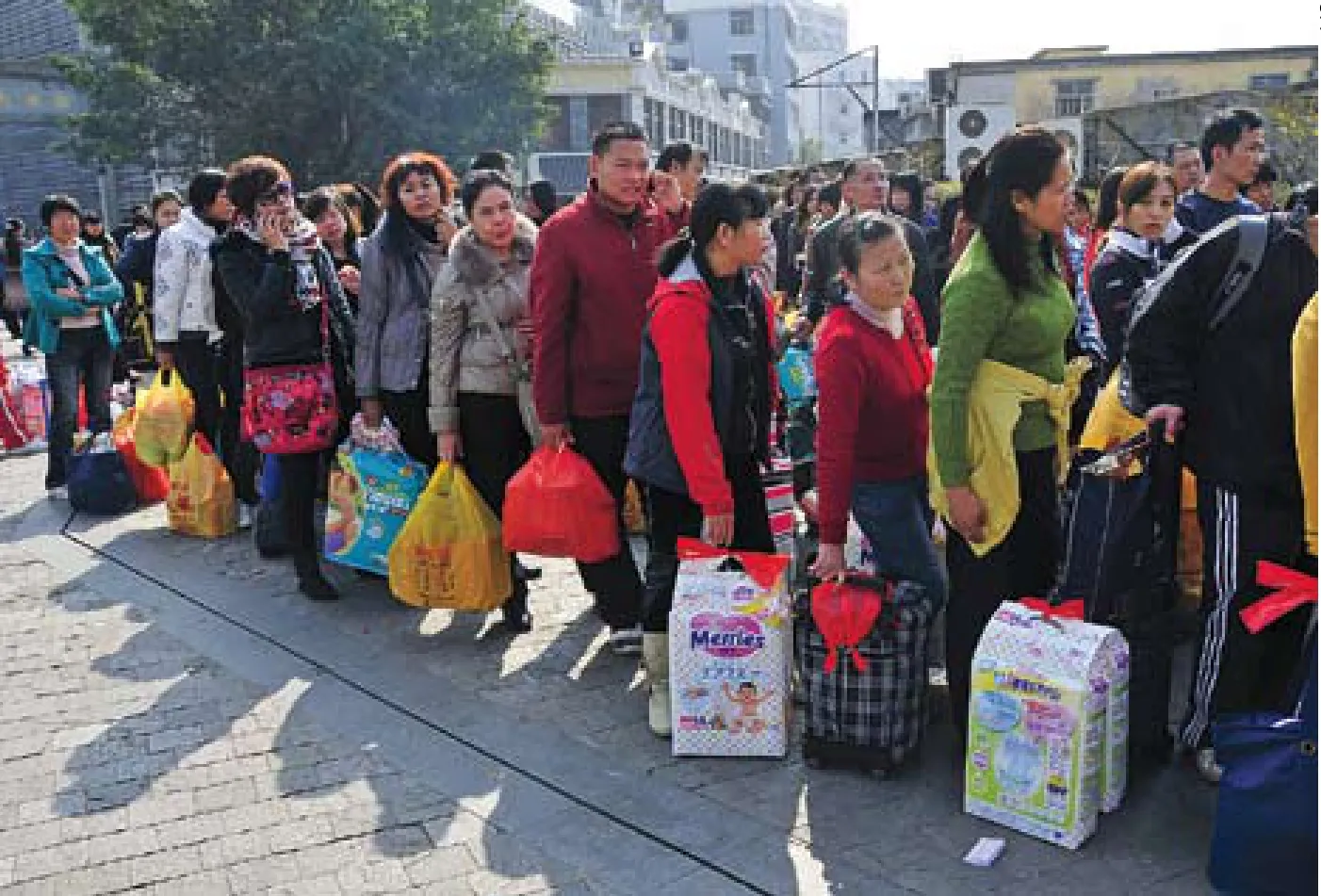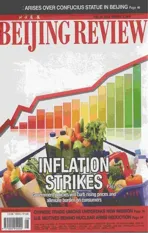Life Under Inflation
2011-11-17ByLIUXINLIAN
By LIU XINLIAN
Life Under Inflation
By LIU XINLIAN
Soaring consumer prices are leaving the average Chinese citizen with less money and more worries
When Ren Xiaofen, an employee at a foreign company in Beijing, returned to work following the Chinese New Year holiday (February 2-8), she found that prices at her favorite lunch spot located conveniently under her offce building had gone up.
“The beef noodle I used to have every day increased to 12 yuan ($1.83) from 10 yuan ($1.52) and cold dishes increased to 7 yuan ($1.07) from 6 yuan ($0.91),” said Ren. “Now my colleagues and I have to spend more time hunting for cheaper alternatives farther away.”
China’s consumer price index (CPI) jumped 4.9 percent as against the same month last year. Food prices represented the highest increase of 10.3 percent in the CPI basket, said the National Bureau of Statistics (NBS).
Oil prices were another concern of Ren’s, due to recent price hikes. Retail gasoline prices increased on February 20 by 0.28 yuan ($0.04) per liter, the second increase in two months. The price of gasoline 93 rose to 7.45 yuan ($1.13) per liter. “I need to pay an extra 100 yuan ($15.2) per month,” said Ren.
Although being a white collar in Beijing, Ren can’t be too carefree about consumer price infation. “Even if food and fuel price hikes accounted for a small percentage of my income, I’m still worried about more severe infation in the near future,” Ren said.
The increasing interest rate also added to her concerns. China’s central bank has raised the benchmark interest rate three times since October 2010, by 0.25 percentage points each time. The one-year lending rate has risen to 6.06 percent. For Ren’s home mortgage loan of 500,000 yuan ($76,100), the interest rate hikes mean she will have to pay an extra 200 yuan ($30.4) a month.
What really caused her to panic is that more interest rate increases are expected to be on the way. Many economists and research institutes forecast the central bank will raise the interest rate at least three times this year. “If this is true, I’ll need to pay another 200 yuan a month for that too,” said Ren.
These changes have made Ren feel anxious given her tepidly increased income. Last year her salary increased several hundred yuan per month, but hardly enough to cover increasing prices and those in the future. Now, Ren fears that her life style will degrade if prices continue to soar.

CFP
Ren’s future isn’t completely grim; she feels lucky that the tuition fee for her 3-yearold son remained the same this year. “It’s because my son is in a government-funded kindergarten. Some of my friends are not as lucky because privately owned ones increased their tuition fees by at least 10 percent this year,” Ren said.
Similarly, Wen Lihua, an editor at a Beijing-based magazine, also fnds that she needs to give her son more pocket money.
“Last year I gave my son 800 yuan ($121.8) a month for living expenses. This year he needs at least 1,000 yuan ($152.2),”said Wen. “Food at the university canteen increased dramatically this year.”
As an average housewife who cooks for the whole family, Wen also feels that soaring vegetable and fruit prices made her wallet even thinner. “Almost all vegetables and fruits are more expensive than a month ago. Tomatoes cost 7 yuan ($1.07) per kg, 2 yuan ($0.3) higher than last month. Apples cost 12 yuan ($1.83) per kg, 4 yuan ($0.61) higher and oranges have increased 5 yuan ($0.76) to 14 yuan ($2.13) per kg, Wen said.
In January, vegetable prices rose 2 percent, but prices of fresh fruits soared 34.8 percent, compared with the same month last year, said the NBS.
Also feeling the pinch because of soaring food prices are retired Wang Shirong and her husband in Jiangsu Province’s capital city of Nanjing, living with a monthly pension of 3,200 yuan ($487).
“Now we have to spend almost 2,000 yuan ($304.4) on food every month. In the past, the food expense was 1,500 yuan ($228.3),” said Wang.
Another important expense they can’t shirk is medical treatment. The old couple needs at least 600 yuan ($91.3) for medicine and treatment every month, said Wang.
“Although our pension increased to 3,200 yuan from last year’s 2,900 yuan ($441.4), prices have increased faster than our pension,” said Wang. “If we don’t pinch pennies, we’re hardly able to make ends meet.”
For those who do not have their own houses in big cities, rent hikes may be the last straw. NBS data also showed rent rose 7.1 percent in January, compared with one year earlier. In January, Beijing saw its rent rise 13.2 percent in January and rent in Shenzhen, Guangdong Province increased 5.5 percent.
An average company employee Zhou Lei in Shenzhen was informed of a rent increase of 500 yuan ($76.1) from 2,300 yuan ($350) only two days before the Chinese New Year, which fell on February 3 this year.
“I will just have to fnd a cheaper place to live. This kind of rent hike is more than I can afford,” said Zhou.
